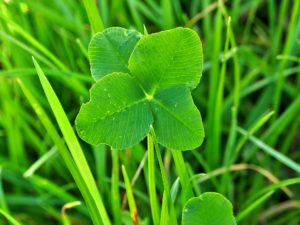MGG’s Ryan Anderson explains why we should start valuing this nitrogen-fixing, low-maintenance “weed”
 After four years working to reduce pesticides in landscapes, I strongly believe it’s time to stop considering clover a “weed”! Clover offers the best tool to eliminate the use of nasty chemicals, while maintaining a lawn that’s both manicured and biodiverse. Don’t believe me? Here are five reasons why Midwest Grows Green loves clover:
After four years working to reduce pesticides in landscapes, I strongly believe it’s time to stop considering clover a “weed”! Clover offers the best tool to eliminate the use of nasty chemicals, while maintaining a lawn that’s both manicured and biodiverse. Don’t believe me? Here are five reasons why Midwest Grows Green loves clover:
- Clover fixes nitrogen: You can satisfy your lawn’s nitrogen needs by simply recycling your grass clippings and covering your lawn with 5% white clover. Clover converts an incredible amount of nitrogen gas to plant accessible ammonium and nitrate. Small swellings in clover roots, called nodules, form a symbiotic relationship with nitrogen-fixing rhizobia bacteria. Rhizobia bacteria do the rest of the work and provide natural, free fertilizer to your lawn!
- We loved clover in the past: Ever wonder why white clover, a plant native to Europe, frequents our lawns in the first place? Because we introduced it! Early last century, many lawn grass seed mixes used clover as its base. Scientists during World War II discovered the chemical 2 4-D that killed broadleaf weeds such as clover, but did not harm monocots such as our turfgrasses. This led to the introduction of the herbicide and fertilizer product, Scott’s Turfbuilder Weed & Feed. The availability of clover lawns dramatically decreased post- World War II. You do the math.
- Bees devour clover pollen: We have a bee crisis in the US. Protein-rich pollen (>25%) serves as an essential component of bee diets. Clover’s pollen is 22.5 to 26% protein. This high protein content added with the fact that their white flowers are highly attractive to bumble bees and honeybees creates habitat in previously desolate lawns for these crucial pollinators.
- Clover lawns are low maintenance: We already know clover replaces fertilizer needs, but it, also, reduces other lawn care tasks we loathe. Hate watering? Clover greens up fast in the spring and maintains that color even in dry conditions. Hate mowing? Clover grows low so you only need to mow a couple of times per year. Hate soil prep? Clover doesn’t care if you have high quality or low quality soil.
- Clover creates aesthetically-pleasing lawns: We understand wanting a clean, manicured and green lawn. You can achieve all these qualifications with clover lawns! Many companies have incorporated an attractive, low-spread clover strain called microclover into lawn mixes. We call these mixes eco-lawns. MGG has formed a partnership with the Oregon-based and women-owned company Pro Time Lawn Seed to install eco-lawns across Chicago. Other eco-lawn seed providers exist, however, and we encourage you to seek them out!
Want to learn more about eco-lawns? Join us this Eco Installation Weekend as we install an eco-lawn in Riverdale, IL on Saturday, September 14th and in Chicago’s Austin neighborhood on Sunday, September 15th.
